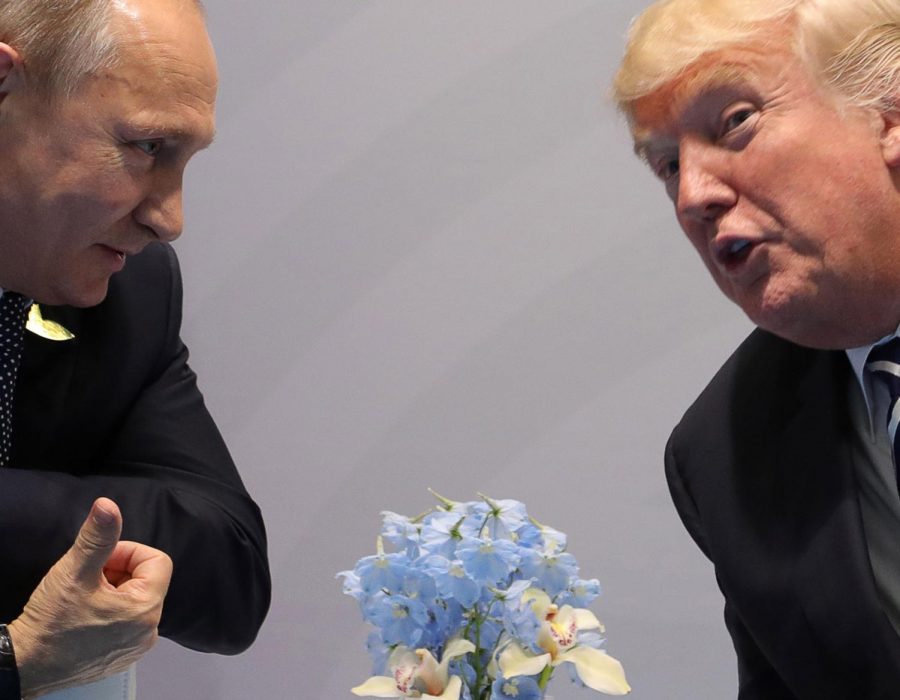LTE: alleged Russian ties continue to haunt Trump
Steve Corbin, professor emeritus of marketing, pens a letter to the editor addressing the Trump administration’s alleged ties to Russia.
Jan 22, 2018
Editor’s note: the following letter to the editor was submitted by Steve Corbin, professor emeritus of marketing at UNI.
Jan. 20, 2018 concluded Donald Trump’s first year serving as our 45th president.
While the self-described “very stable genius” has successfully appointed a Supreme Court justice, reversed numerous Bush and Obama executive orders, taken credit for America’s stock market prowess, retreated from America’s historical free trade agreements and climate control commitment and passed tax reform, a larger story still haunts Americans: Trump-Russia.
Simply put, patriotic Americans will not sleep well until the final chapter of the Trump-Russia mystery has been written.
David Leonhardt, op-ed columnist for The New York Times, and Susan Hennessey, managing editor for Lawfare and Brookings Fellow in National Security Law — two respected authorities who have thoroughly investigated this conundrum — offer their theories behind this haunting scene.
One year ago, Leonhardt asserted five possible explanations for Trump’s “Russophilia.” The storylines still exist today.
The first justification of Trump’s ties to Russia is where Trump claimed with fewer USA-Russia tensions, humanitarian crisis situations throughout the world would decline. Hence, we should be nice to Russia.
Trump’s business conspiracy is the second explanation. Because most regulated American financial institutions refuse to lend money to Trump’s debt-ridden company, he relied on Russia Federation banks (i.e., “Russians make up a pretty disproportionate cross-section of a lot of our assets” — Donald Trump Jr., 2008).
Since Trump won’t release his tax returns, 68 percent of Americans surmise Trump’s hiding something.
A third possible motive — “the most alarming,” according to Leonhardt — is Trump publicly expressed he is enamored with Putin’s power and also wants “very strong control over his country,” including the government’s legislative and judicial branches.
The fourth account is the political conspiracy (the center of the FBI investigation led by Robert Mueller, Republican) where “it’s alleged Putin’s government, in cooperation with Trump’s aides, directed pro-Trump cyberattacks prior to the 2016 election.”
The fifth reason, the idea contained in a dossier compiled by private investigators Fusion GPS and Christopher Steele that Russia had compromising material on Trump, has resurfaced as being more and more credible.
Besides Leonhardt’s five theories, Susan Hennessey, a cybersecurity expert, offers two other scenarios to help Americans solve the puzzle.
First is the “innocent” plea where Trump aides, who had never been involved in politics, “unwittingly blundered into a campaign by Russia to influence American policy and create chaos. The Trump officials cooperated with Russian nationals because they didn’t know they shouldn’t. They then lied about their contacts because those contacts were embarrassing, not because they were part of a sophisticated conspiracy. The cover up is worse than the crime.”
Hennessey’s last surmise is, in essence, “guilty as charged, your Honor.” The Trump team knew what they were doing in getting Russia to help their campaign.
Because of Trump’s Russia bank financial entanglements (and other possible compromises) the Trump campaign officials had no choice but to advance the interests of a foreign power and lie about the Russia contacts.
Patriots of America’s constitution — whether they are a White House aide or cabinet member, in Congress, journalist or citizen — must come forward with known credible information to ensure truth prevails.
Anyone who withholds information of the Trump-Russia mystery or impedes the House, Senate or FBI independent investigations should be charged with treason.
Let’s put the final chapter of the quandary to bed so Congress can address significant issues that have been largely ignored for the past 365 days like the budget, children’s health insurance, civil rights protection, criminal justice reform, cybersecurity, defense, disaster aid, education, energy grid fortification, farm bill, federal deficit, foreign policy, homelessness, immigration, infrastructure, Medicaid, Medicare, opioid crisis, Social Security, tamper-proof election security, veterans and women’s inequality, to name a few.

















